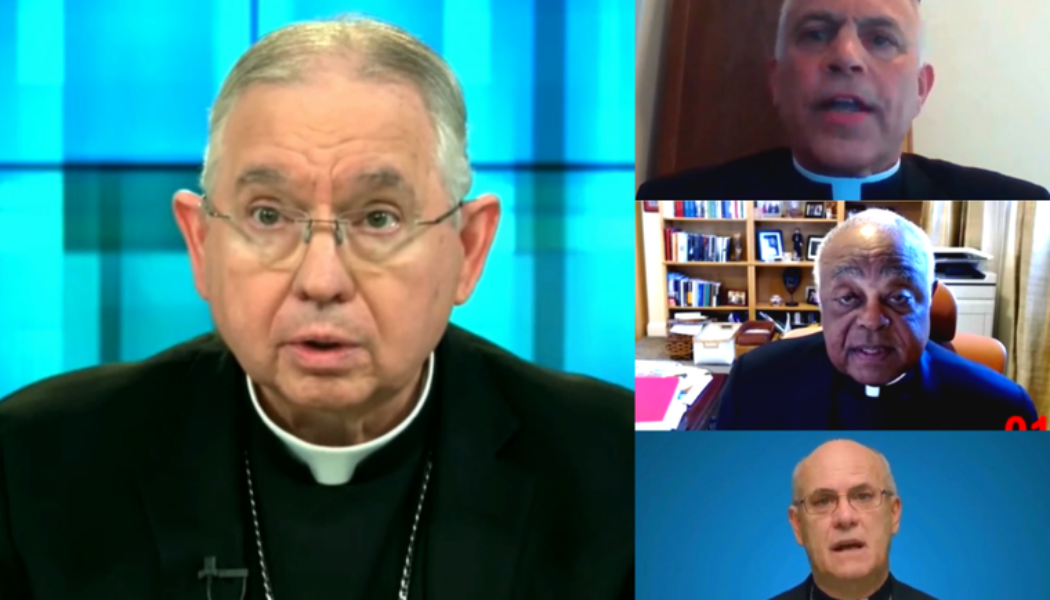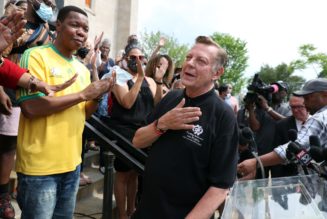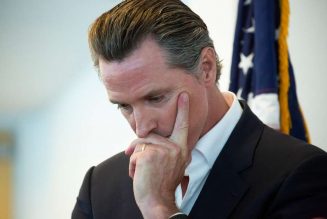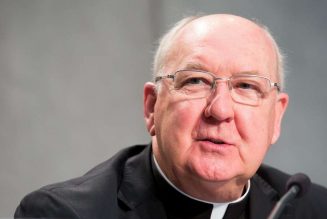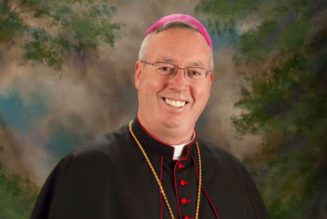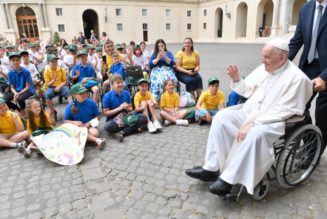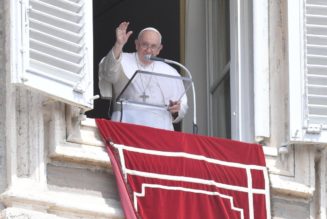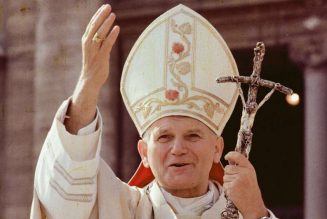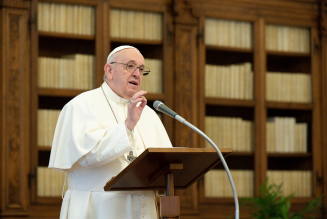
WASHINGTON — The second day of the U.S. Conference of Catholic Bishops’ (USCCB) spring general assembly featured a lengthy and passionate debate over the proposal to draft a document on the Church’s teaching on the Eucharist.
The document, which would include a discussion of worthiness to receive Communion, remains a hot-button issue given the many Catholic public officials who go against Church teachings on the issue of abortion and yet continue to receive Communion.
Those involved in the document’s drafting insisted that it was not aimed at particular individuals and was not meant to institute a national policy, but U.S. President Joe Biden’s name came up several times in the discussion due to his administration’s aggressive pro-abortion stance despite his avowed Catholicism.
What appeared to be a vocal minority of the bishops pushed for delay on drafting any document and asked for more dialogue on the matter given its contentious nature. Most of the bishops seemed to be supportive of drafting the document and spoke to the need to do so in light of widespread ignorance among the faithful regarding the Church’s teaching on the Eucharist, as well as the scandal to the faithful caused by Biden. The results of the vote on the draft proposal will be released Friday.
The debate came following an effort by some bishops Wednesday to delay the motion to draft the document until every bishop had a chance to speak on the matter, a move others called a “filibuster” because it would make a vote on drafting the document impossible. The issue has been hotly contested in the months leading up to the assembly, with Cardinal Luis Ladaria, the prefect of the Vatican’s Congregation for the Doctrine of the Faith, cautioning USCCB president Archbishop José Gomez of Los Angeles in May about crafting “a national policy” on the matter, “given its possibly contentious nature,” and suggesting the debate “would best be framed within the broad context of worthiness for the reception of Holy Communion on the part of all the faithful, rather than only one category of Catholics, reflecting their obligation to conform their lives to the entire Gospel of Jesus Christ as they prepare to receive the sacrament.”
The Document’s Scope
Bishop Kevin Rhoades of Fort Wayne-South Bend, Indiana, the chairman of the U.S. bishops’ Committee on Doctrine that wrote the outline of the document and would be tasked with drafting it, explained in prepared remarks over the meeting’s Zoom format Thursday that the proposal has been “the subject of misunderstanding and even mischaracterization” among the bishops.
Indirectly rebutting the claims that it’s directed specifically toward Biden’s strong promotion of legal abortion, he said the document originated out of concern among the bishops over the “proven decline in belief in the Real Presence among our Catholic faithful,” citing a 2019 Pew poll that just a third of U.S. Catholics believe in the Real Presence.
The document would discuss the Eucharist as “a mystery to be believed” a “mystery to be celebrated” and a “mystery to be lived.” That third portion of the document would touch on the worthiness to receive Communion as, Bishop Rhoades said, “one cannot discuss the centrality of the Eucharist as the source and summit of the Christian life without addressing those actions that inflict damage to the honor due the sacrament or cause scandal to the faithful.”
He added that the statement would not set forth national norms but rather lay out existing teaching on the matter and “was never considered by the committee on doctrine to be a statement about any one individual or about any one category of sinful behavior, rather it would bring heightened awareness among the faithful of the need to be to conformed to the Eucharist and to bear public witness to the faith through a call to conversion.” The fact that establishing national norms is significant to the debate regarding whether and how to proceed, as Cardinal Ladaria’s cautionary letter to Archbishop Gomez appeared to be predicated on the belief that this was what the U.S. bishops were intending.
Bishop Rhoades received pushback almost immediately. Cardinal Blase Cupich of Chicago, who signed a letter to Archbishop Gomez asking that the debate over worthiness to receive Communion be delayed until the bishops’ next in-person meeting, voiced concerns that the document would be interpreted as aimed at certain politicians like Biden, and that he didn’t know “how we get around that if we pass on this document.”
Cardinal Cupich called for a removal of the section on worthiness to receive Communion and said those who pushed for the draft wanted the bishops “to do something about politicians who hold positions that are contrary to our teaching and let’s not fall into that trap.”
Intended for All Catholics
Bishop Rhoades responded that document was intended for all Catholics, not just politicians, and would be a teaching document focused on “the reasons behind the Church’s discipline.” He said that the document wasn’t “targeting particular individuals” or limited to the issue of abortion. He called for acceptance of “the Church’s discipline that those who obstinately persist in manifest grave sin are not to be admitted to Holy Communion,” but added that individual bishops decide how to apply that so the bishops wouldn’t be doing that in the document.
Archbishop Alexander Sample of Portland, Oregon, made the case that “there’s nothing in Cardinal Ladaria’s letter that is inconsistent with the work that Bishop Rhoades and his committee is proposing,” since the proposal was not about a national policy, but a teaching document. He also referenced Cardinal Ladaria’s call for dialogue with Catholic politicians on the issue saying “that happens a lot. I know I speak with many bishops and it’s been reported in the media how many bishops have had dialogues with our Catholic political leaders on this.”
While Cardinal Cupich has now twice raised concerns in this week’s meeting that there must be time for dialogue with these politicians, he told CNA in 2019 that he had ongoing “conversations” with Catholic leaders in the Illinois state Legislature who championed an abortion coverage mandate. He said he believed it would be “counterproductive” to deny Holy Communion in his archdiocese to the legislators who championed the law.
Bishop Joseph Tyson of Yakima, Washington, asked Bishop Rhoades to what extent the document was “about making a point on abortion to the exclusion of other important issues?” He replied that “you can look at a variety of issues” when considering worthiness to receive Communion and raised the example of the scandal of a white supremacist leader or individual involved in human trafficking attempting to receive Communion. Bishop Rhoades added that at this point he doesn’t “know in the document if we’re going to get into specific issues” but was open to hear from various bishops on the matter.
Additional Objections
Bishop Robert McElroy of San Diego backed the call to remove the portion of the document addressing Eucharistic consistency and argued that the proposal is part of the “groundwork for a fundamental shift in how bishops should present our faith in public discussion,” which “would make the denial of the Eucharist a significant element of our teaching office in contemporary society.”
He worried that the bishops were headed down that road and the consequences of that were that the Eucharist would be “weaponized” in partisan battles and being barred from reception of Communion would only apply to politicians opposed to the Church’s stance on abortion and euthanasia, which the Church teaches are intrinsically evil, rather than issues like racism and environment. Bishop Rhoades countered with a reminder that the Committee on Doctrine was not planning on limiting it to those two issues.
Cardinal Wilton Gregory of Washington, D.C., who oversees the archdiocese where President Biden resides, notably sided with the bishops urging more dialogue and raising concerns about the divisiveness of the subject.
He said, “the choice before us at this moment is either we pursue a path of strengthening unity among ourselves, or settle for creating a document that may not bring unity, but may well further damage it.”
A couple of bishops raised other objections to the document, worrying that it would not be an effective teaching document.
Archbishop Michael Jackels of Dubuque, Iowa said he opposed drafting the document because he believed there are “adequate instructions already published” and that “a diocesan pastor or a parish pastor is competent and motivated to teach” about the Eucharist and worthiness to receive it.
“I don’t think that the issues that we’re bringing up are going to be addressed by a document from the conference or by this initiative on Eucharistic revitalization,” he said.
Bishop Shawn McKnight of Jefferson City, Missouri, pointed out the “division in the conference in terms of how we’re perceiving the context and the letter from Cardinal Ladaria and, therefore, the content of what is being proposed.”
He said that while he would back a “teaching document” on the Eucharist, the draft proposed sounded like it would go beyond that and “there isn’t a strong canonical foundation for us to be involved in the specific question of Eucharistic consistency, the discipline of deciding who gets Communion and who doesn’t.”
Scandal to the Faithful
In support of proceeding with the drafting of the document, many bishops raised concerns about the scandal of the lack of clarity on Eucharistic teaching at the present moment.
Bishop Donald DeGrood of Sioux Falls, South Dakota, said some in his diocese are “scandalized that the U.S. bishops haven’t come out yet with something clear. It’s already in our teachings, I see it as a reaffirming the beautiful faith that God has entrusted to us.”
Archbishop Joseph Naumann of Kansas City, Kansas, head of the U.S. bishops’ pro-life committee, said “this is a particularly important moment that we speak” on the Eucharist. He also called Catholic politicians to “integrity” in rebuking “those in public life who then flaunt their Catholicity, love to describe themselves as devout Catholics” and back abortion.
He referenced Biden and his backing of taxpayer-funded abortion calling him “a Catholic president that’s doing the most aggressive thing we’ve ever seen in terms of this attack on life when its most innocent.” Archbishop Naumann recalled the bishops naming abortion as a “pre-eminent” issue in 2019 because “it attacks life at its most vulnerable” and said that Pope Francis had agreed with that assessment during an ad limina visit. He said that “when we receive the Eucharist” we are affirming our beliefs in the teachings of the faith.
San Francisco Archbishop Salvatore Cordileone, who wrote earlier this year about why pro-abortion politicians should not receive Communion, also called discussion of the issue “very timely” and said the document would prove a “valuable resource” and serve as a guide for bishops on the Communion issue. He added that the bishops must make a statement on this “core teaching” of the Eucharist because “how can we expect to be taken seriously on any other topic?”
Bishop Donald Hying of Madison, Wisconsin, also viewed the moment as a crucial time for some clarity from the bishops on reception of the Eucharist.
He said he speaks “almost daily” with laity who “are confused by the fact that we have a president who professes devout Catholicism and yet advances the most radical pro-abortion agenda in our history. That leaves them concerned and confused and I think they’re looking for some direction, some teaching from us.”
Bishop Thomas Daly of Spokane, Washington, noted “an aggressiveness in a number of elected officials” on the issue and wondered if the call for waiting and dialogue from some of his fellow bishops “is meant not truly to listen but to delay.” He called this “a time for us to clarify, to speak the truth in humility and charity.”
The bishops need a simple majority for drafting of the document to proceed and to be presented to the general assembly who are expected to meet in person in their November meeting.
Join Our Telegram Group : Salvation & Prosperity
